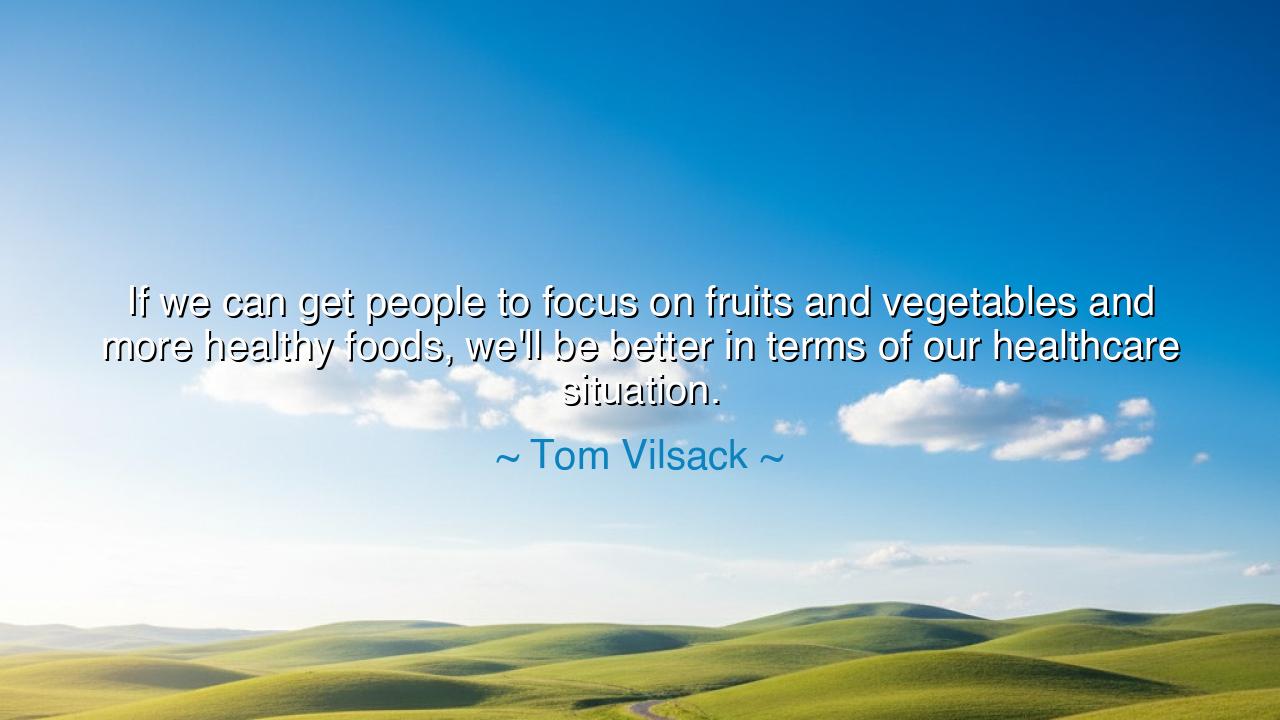
If we can get people to focus on fruits and vegetables and more
If we can get people to focus on fruits and vegetables and more healthy foods, we'll be better in terms of our healthcare situation.






The words of Tom Vilsack, “If we can get people to focus on fruits and vegetables and more healthy foods, we’ll be better in terms of our healthcare situation,” are both humble and prophetic. Beneath their simplicity lies an ancient truth — that the strength of a nation begins not in its armies nor in its wealth, but in the health of its people. Vilsack, speaking as a steward of the land and of public welfare, reminds us that health does not begin in hospitals but in the soil, the seed, and the choices we make at the table. The food we eat is not merely sustenance; it is the foundation of our vitality, the fuel of both body and spirit.
The origin of this quote can be traced to Vilsack’s long service as the United States Secretary of Agriculture, where he sought to bridge the gap between food policy and public health. In a time when modern society had grown distant from the earth — when processed foods had replaced the simplicity of the garden — he became a voice calling for return to the essentials. His plea was not only practical but philosophical: that wholesome food is medicine, and that every citizen who nourishes himself wisely strengthens not only his own body, but the very fabric of the nation. It was a call to awaken responsibility — to see health not as a privilege granted by systems, but as a discipline cultivated through daily care.
This truth was well known to the ancients. The Greek physician Hippocrates, called the father of medicine, taught, “Let food be thy medicine, and medicine be thy food.” The sages of China and India wrote of balance — of yin and yang, of the five elements, of harmony between man and nature. In their wisdom, food was sacred, for it carried the essence of life. To eat from the bounty of the earth was an act of reverence; to eat carelessly was a form of neglect. Vilsack’s words, though modern, are born of this same eternal philosophy: that the body reflects the order — or the disorder — of one’s habits, and that nations mirror the health of their people.
A living example of this truth can be found in the Japanese tradition of mindful eating. For centuries, Japan has maintained one of the world’s longest life expectancies, not through wealth or luxury, but through simplicity — small portions, fresh fish, rice, green tea, and above all, vegetables in abundance. Meals are seen as rituals of gratitude, not consumption. Children are taught from an early age to respect food as a gift from nature. The result is not only longevity but serenity — a culture where food nourishes the spirit as well as the flesh. This, too, is what Vilsack envisioned: that a people reconnected with the earth would become stronger, calmer, and more resilient.
But his words also carry a warning. A society that forgets the wisdom of natural eating invites its own decay. The overconsumption of sugar, fat, and artificial foods has not only sickened bodies but burdened healthcare systems, draining vitality from entire nations. Hospitals overflow, not from the wounds of war, but from the quiet casualties of neglect — the diseases of abundance. Vilsack’s insight was not merely about food; it was about discipline, gratitude, and foresight. He understood that a civilization that feeds its people poorly starves its future.
His quote calls us to a new form of heroism — not on the battlefield, but in the marketplace and the kitchen. To choose fruits and vegetables, to eat what grows close to the earth, is not a small act; it is a moral and civic one. It honors the farmers who labor for the harvest, the earth that gives life, and the generations that will inherit our choices. Each meal becomes an act of stewardship, a quiet rebellion against the forces of greed and indifference that profit from decay. Health, in this sense, is not only personal — it is an act of citizenship.
The lesson of Tom Vilsack’s words is as timeless as it is urgent: return to the roots of nourishment. Eat what is alive, fresh, and true. Seek balance in your plate as in your heart. Remember that health is not born in clinics, but in gardens and kitchens, in daily acts of mindfulness. To eat wisely is to honor life itself — for the food we choose shapes the destiny we live.
So let these words endure as a teaching for all generations: a people who eat from the earth will stand strong upon it. Let every home become a temple of nourishment, every meal an offering to vitality. For when the body is strong, the mind is clear, and the spirit is calm, the nation itself will thrive — not through medicine, but through wisdom, and not through wealth, but through the humble blessings of the soil.






AAdministratorAdministrator
Welcome, honored guests. Please leave a comment, we will respond soon